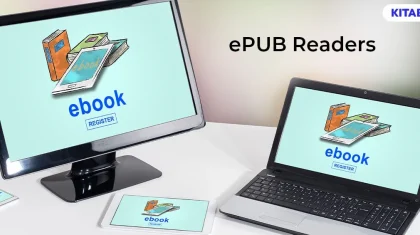
eBook Protection: How to Secure eBooks from Piracy?
Piracy has always been a major concern for all forms of digital media. The same is applicable to eBooks in the current digital landscape.
Writers, publishers, and self-published authors are grappling with the persistent challenge of piracy in the digital realm. In this context, the threat to eBooks is real, prompting a collective need for robust solutions.
Fortunately, there are several effective measures that can be implemented to protect eBooks from piracy.
In this post, we will take you through the top eBook protection strategies to help you safeguard your literary creations in 2024 and beyond. Let’s get exploring!
Table of Contents:
II. What is DRM and How Does it Help in Fighting Piracy?
III. 5 Ways to Protect Your eBooks from Piracy
- Limiting eBook Downloads
- Choosing the Right File Format
- Restrictions on Editing
- Registering a Copyright
- Using Safe Distribution Services
What is eBook Piracy?
eBook piracy involves the unauthorized distribution and sharing of eBooks that are copyrighted over the internet or other digital mediums without the publisher’s or author’s consent.
Like films and music, pirated eBooks that are distributed illegally can hurt the author or publisher of the book by incurring potential revenue losses. This not only undermines the financial aspect but also poses a threat to the intellectual property rights of the author or publisher.
What is DRM and How Does it Help in Fighting Piracy?
Digital Rights Management (DRM) serves as the initial line of defense in the protection of eBooks. It is a sophisticated technology embraced by eBook retailers and publishers with the primary objective of thwarting unauthorized access to and distribution of their literary works.
Operating on a multifaceted level, DRM achieves its protective function by either inhibiting users from creating digital copies of the eBook or by constraining the extent of their access to the content.
DRM can be used for:
- Restrict users from saving and forwarding content.
- Restrict users from printing content.
- Prevent users from taking screenshots.
- Limit access based on IP addresses and devices.
- Watermark content to maintain ownership.
All of these work together to ensure that proper eBook protection measures are in place while distributing eBooks online.
5 Ways to Protect Your eBooks from Piracy
There are several solutions available to successfully prevent eBooks from being pirated.
Let us look at some of these measures:
Limiting eBook Downloads
One fundamental approach to fortifying your eBooks against piracy involves limiting the number of downloads.
While this is just one facet of a comprehensive eBook protection strategy, combining such measures with advanced technologies and vigilant monitoring can significantly enhance the security of your digital literary creations in the ever-evolving digital landscape.
Typically, eBook platforms set a download limit, often around 3 or 5, recognizing that customers may encounter challenges during their initial download or may wish to access the eBook across multiple devices. This restriction accommodates users who may require additional download attempts and acknowledges the contemporary need for flexibility in digital content consumption.
Choosing the Right File Format
Depending on how an eBook is going to be distributed, there are different file formats available. One can distribute eBooks through their own website or by using an online retailer or e-commerce store.
Make sure you select the appropriate file format tailored to your specific distribution method when making decisions about your eBook. Whether distributing directly through your website or utilizing an online retailer or e-commerce platform, the choice of file format plays a pivotal role in ensuring compatibility and accessibility for your audience.
For distribution through your website, consider formats like PDF or EPUB, which provide versatility and ease of access for readers. KITABOO, as an example, is a digital platform that facilitates a diverse range of file formats, allowing authors and publishers to choose the most suitable option for their distribution strategy.
Restrictions on Editing
One can make use of the features available in Adobe to restrict copying and editing of eBooks if an eBook is being made available in PDF format.
Even though it won’t prevent the book from being pirated, it would help save the eBook from unfair usage. Software tools can help in restricting text and images from being copied, including restrictions on editing and printing of the document.
Registering a Copyright
For most countries, there are laws in place that safeguard digital content from being illegally reproduced and tampered with. These laws are applicable to eBooks, too. In case of copyright infringement, you will be able to seek legal help if you have registered a copyright for your eBook, thereby allowing you to file a lawsuit in case of piracy.
The copyright process will require some money and time, depending on the location, but it will act as a safeguard against unauthorized reproduction of your work and facilitate eBook protection.
Guide:
How to Build an eBook Store
Using Safe Distribution Services
One of the ways to ensure eBook protection is to go with a reputed and trustworthy eBook distribution service. An eBook distribution platform helps authors and publishers facilitate the dissemination of their eBooks to the proper audiences. These distribution services have security protocols that prevent the eBooks hosted on their platform from being misused and also offer tools that can aid in increasing sales and revenue.
KITABOO, for instance, stands as a noteworthy example of a distribution service that not only prioritizes security but also provides additional tools to enhance sales and revenue.
What is the Impact of eBook Piracy?
Below are the major challenges that an author, publisher, or eBook store might face because of piracy:
- Loss in Revenue: The direct consequence of piracy is a loss in revenue and sales of the book. Every time a book is illegally shared, the money that might have been earned isn’t reaching the author or the publisher.
- Lack of Incentives for Authors: Authors, who spend so much time and effort producing the content might become demotivated if they are not able to get appropriate financial returns for their work.
- Online Security: Platforms that promote piracy can often become a source of malware and viruses, thereby endangering users who access these platforms.
- Lack of Innovation: Publishers use the earnings made from the books to look for new and emerging talents and provide opportunities for them to establish themselves as authors. Piracy can create hurdles in this process of discovery.
Conclusion
While piracy cannot be completely eradicated from the world, there are effective measures and strategies that individuals and industries can implement to mitigate its impact on eBooks.
By partnering with digital textbook platforms like KITABOO, you can ensure that your eBook is safe from illegal distribution and unauthorized use. We not only ensure the security of your intellectual property but also provide a platform that fosters a conducive environment for legitimate distribution.
Contact us for more details!
Discover how a mobile-first training platform can help your organization.
KITABOO is a cloud-based platform to create, deliver & track mobile-first interactive training content.



